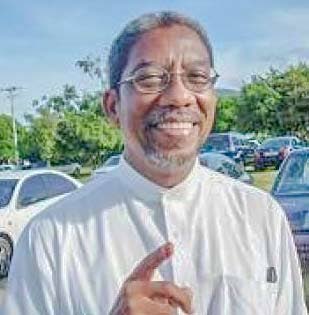Helping Venezuela

CLYDE WEATHERHEAD
THERE IS A kind of surrealism surrounding the issue of the influx of Venezuelans into this country.
Recent headlines repeating government statements on the issue reveal how wide off the mark these statements are in relation to what is really needed if TT is to help Venezuela in overcoming its present difficulties.
“PM: TT not the solution for millions of Venezuelan migrants” one headline read. Another, “TT to Maduro: Handle your borders.”
While the PM said “…TT can only provide limited help,” his National Security Minister called on “…the Venezuelan authorities to step up their border patrols to try to stem the influx of migrants to TT.”
Is this the same minister who only recently claimed that the TT “security forces” were turning back boatloads of illegal Venezuelan migrants in the maritime domain and TT’s borders were being secured?
Not so long ago there was a debate about whether there was a humanitarian crisis in Venezuela.
The Government correctly, in my estimation, focused on the political problems and the need for their resolution by the Venezuelans themselves and convinced its Caricom colleagues of the value of its position to the point of the regional grouping adopting that position as its own.
At the heart of the problem in Venezuela is the pressure being applied by the US and its meddling in the affairs of that country, aiming to impose a governance system and regime favourable to US interests and hemispheric and global objectives.

The campaign to deprive the people of Venezuela their right to a political system of their own choice and to impose regime change is not new or recent. It dates back to the initial victory of Hugo Chavez at the polls and the coup attempts to depose him.
The imposition of five years of embargo and sanctions against individuals and more recently against state-owned oil company PDVSA have the effect of confiscating resources vital to the economy of Venezuela and the needs of its people.
Such actions are contrary to international law which applies to the relations between and among states. They, as well as those applied by European allies of the US, have no legitimacy in any resolution or decision of the UN.
If anything, any claim to legality of these hostile acts can only be made in the sphere of US outlook and the unilateral actions of its President and Congress.
No country can claim there is a humanitarian crisis in Venezuela and its only measure is to deprive that country of its own financial resources and organise provocations on its borders and support open attempts at fomenting a military coup d’etat.
These hostile actions of the US and its allies only serve to deepen the political crisis in Venezuela and deprive the Venezuelan people of a peaceful resolution to political issues.
These aggressive acts also only make matters worse by depriving the country of material etc needed to meet the basic needs of the people.
No country can claim humanitarian concern for the Venezuelan people and engage in such hostility against that country, all to serve its own ends.
If the PM is serious about assisting the people of Venezuela, he must use all opportunities and all assets available to push for a solution to the real sources of the crisis and for immediate relief for the people.
Accepting refugees or not is not about solving the problems in Venezuela. Nor is registering Venezuelan migrants in TT and offering temporary possibilities of work by Government or charitable donations by citizens going to bring about a lasting solution.
Loss of human capacity through forced migration has not solved any problem in Iraq, Syria, Libya, Palestine, Nigeria, Ukraine, Sudan, Yemen or anywhere else. That loss of human capacity only negatively impacts the possibility of any society to develop further.
The PM must use his own voice and that of this nation’s representatives at regional, hemispheric and global fora to denounce the anti-humanitarian and illegal acts of the US and demand an end to sanctions and embargoes to assist Venezuela in providing for its people and solving its problems.
Accepting USAID money to assist refugees while remaining silent about the confiscation of the proceeds of the sale of oil and denial of access to Venezuela’s wealth by the Anglo-American powers will not, in the final analysis, really help the Venezuelan people.
Non-intervention and non-interference in the internal affairs of other states must not only be said. Upholding such principles of enlightened international relations also requires action to stop violations of the said principles by others.
Real help for Venezuela cannot be provided by inaction based on those principles with excuses such as “...we have a responsibility to protect the interest of the people of TT first and foremost.”
TT, as a small nation, cannot accommodate and provide for the needs of a significant displaced population of Venezuelan people. But our capacity to assist Venezuela and its people on a global scale lies in adherence to and advocacy for all states to halt the hostile acts against that country and meddling in its internal affairs.
Internationalism involves fighting for the rights of one’s own country and standing in the defence of the rights of others.
Size is not an impediment to such action.


Comments
"Helping Venezuela"